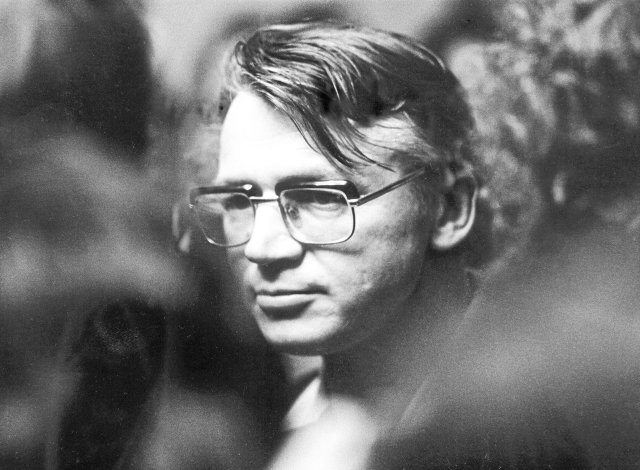He could also be an attentive listener, the heretic and heretic Rudolf Bahro.
Photo: Imago/Friedrich Stark
Shortly before his death, Rudolf Bahro wrote his last major text in 1995: The “Book of Liberation from the Fall of the GDR,” addressed to Sahra Wagenknecht. She was the young, radical face of the Communist Platform in the PDS. Bahro saw her as a beacon of hope who would show a way out of industrial society. But she was not the first leading figure that Bahro had chosen. Whether Lenin, Stalin, Mao, Beethoven, Bhagwan or Wagenknecht: He had a soft spot for messianic hopefuls – who did not always live up to his expectations.
His book “The Alternative” made the inconspicuous SED official world famous in 1977. But where did Bahro come from and how was he politically socialized? Thomas Schubert, who studied with Bahro in the 1990s, is now closing this research gap with his dissertation. To do this, he evaluated all published texts, spoke to contemporary witnesses and searched archives.
After the end of the war, Bahro was separated from his mother and two siblings while fleeing Lower Silesia. They died shortly afterwards, while Rudolf survived. After finding his father again, Bahro grew up in the Oderbruch. Until now, it was assumed that he was already loyal to GDR socialism here. But Schubert mentions a new detail: the student Bahro wrote anti-Polish and anti-Stalinist polemics and pamphlets. He only stopped after being summoned to the school principal in 1952. Grateful for the conversion and the non-punishment, he became enthusiastically involved in the FDJ and the SED from then on. A poem has survived, a 16-page hymn to Lenin and the October Revolution, which Bahro probably recited in front of the assembled auditorium as a high school graduate. He was a hard-working poet who was even able to achieve small successes. One of his poems made it into “Sinn und Form”, others can be found in a volume of poems published in 1960 in the “Answer Us!” series.
nd.DieWoche – our weekly newsletter

With our weekly newsletter nd.DieWoche look at the most important topics of the week and read them Highlights our Saturday edition on Friday. Get your free subscription here.
The young Bahro was a great zealot, an agitator who saw Stalin as an idol-like reference figure, Lenin as a kind of messiah and Marxism-Leninism as the doctrine of salvation. Schubert recognizes in him the type of a believing theologian. For him, the church character of the Leninist party, its rituals, its claim to infallibility and the contradictions that resulted from this are elements of such an alternative religious worldview. Bahro himself also saw it that way. In the “Alternative” he describes himself as a heretic, a heretic in the tradition of church reformers of past centuries who opposed the depraved clergy with the original writings.
Bahro began studying philosophy in Berlin in the mid-1950s. The XXth century fell during his time as a student. Congress of the CPSU and the tearful realization that Stalin was a criminal. He protested against the suppression of the uprisings in Hungary and Poland in 1956 on a wall newspaper and escaped unpunished. On the other hand, he remained silent when fellow students were punished for political reasons and remained loyal to an idealized Leninism. In Bahro’s diploma thesis on Johannes R. Becher, his work is adapted to the party’s history. “Bahro ultimately graduated in the subjects of spirituality and propagandistics,” says Schubert. Fresh out of university, Bahro went to Oderbruch as an SED agitator – and failed miserably. The farmers hadn’t waited for a greenhorn from Berlin. He left the village and moved via Berlin to Greifswald, where he worked for the university newspaper. Two years later he went back to Berlin, to the science union. For Bahro, all of these positions were more necessary party work than a fulfilled lifelong dream.
In the summer of 1963, the SED passed a youth communique. It was intended to motivate the young generation to build socialism. At the same time, the elders wanted to place more trust in her. That would have meant less ideological and petty-bourgeois fuss. Bahro took it at face value. In reality, the impulse from young people was only desirable if it conformed to the system. His disappointment was inevitable. Inspired by Fritz Behren’s reflections on “subjectivism”, by the intentions of the youth communique, by Mao’s Cultural Revolution, he soon saw the SED as a structure made up of two generations: on the one hand, the conservative old people in power who wanted to hold on to the status quo, and on the other hand, the idealistic one Youth who strived for communism.
A fundamental contradiction of real socialism was the social stratification that emerged with a new elite. This contradicted the ideology of a classless society. Either the ideology had to be adjusted or society had to be reformed. Against this background, Bahro slowly began to turn away in the mid-1960s. At that time he had a job as an editor at the student newspaper “Forum”. Here he was able to contribute intellectually and had certain freedom, but also limits that he tried to explore. In 1966 he overreached and was fired after publishing a critical Volker Braun piece. Schubert found an unpublished text transcript from this year. Bahro interviewed cultural official Alfred Kurella for three days. It was about questions of Stalinism. As a contemporary witness, Kurella reported on the Great Terror under Stalin, to which his brother also fell victim. For Bahro, the conversation was disillusioning. It only appeared in the “Forum” after his dismissal, heavily edited and without naming the author. In the meantime, he had already been transferred to a rubber plant, where from then on, as a sociologist, he was able to directly follow everyday work in the workers’ and farmers’ state with all its contradictions between ideology and practice. After the suppression of the “Prague Spring” he began writing “Alternative” out of revenge motives, but never wanted to overcome the GDR as a state. He hated the Western system. The GDR should be reformed back to its Marxist roots.
Bahro’s essay on Beethoven makes this clear. The text consists of two parts, the first written before the events in Prague, the second after. Part one was even published in Russian in the Soviet Union, mediated by Mikhail Lifschitz. Bahro originally wanted to do a dissertation on this topic, but was unable to realize the plan. Schubert analyzes “The Beethoven Example” in the overall discourse surrounding the understanding of romanticism in the GDR. While the work on Becher still followed the anti-Romantic impetus of Georg Lukács, the “Beethoven example” reflects Bahro’s disappointment, which he now countered through revolutionary romanticism.
Schubert comes to the conclusion that the early work that ends here can be understood as the “key to the complete work”. Much of what was planted here came to fruition later. Even though it is quite lengthy, Schubert’s dissertation is an important piece of work. It reveals that the young Bahro was already well connected with various greats from politics, culture and literature. Most of them dared to break small taboos, but not the big test of strength. Bahro, on the other hand, only saw heresy as a way out, driven by the “principle of hope” of his idol Ernst Bloch.
Thomas Schubert: Civil War and Romanticism in Real Socialism. On the early work of Rudolf Bahro (1952–1970). A worldview analysis. Nomos, 1036 p., hardcover, €169.
#ndstays – Get active and order a promotional package

Regardless of whether it is pubs, cafés, festivals or other meeting places – we want to become more visible and reach everyone who values independent journalism with an attitude. We have put together a campaign package with stickers, flyers, posters and buttons that you can use to get active and support your newspaper.
To the promotional package
judi bola judi bola online sbobet sbobetsbobet88judi bola
